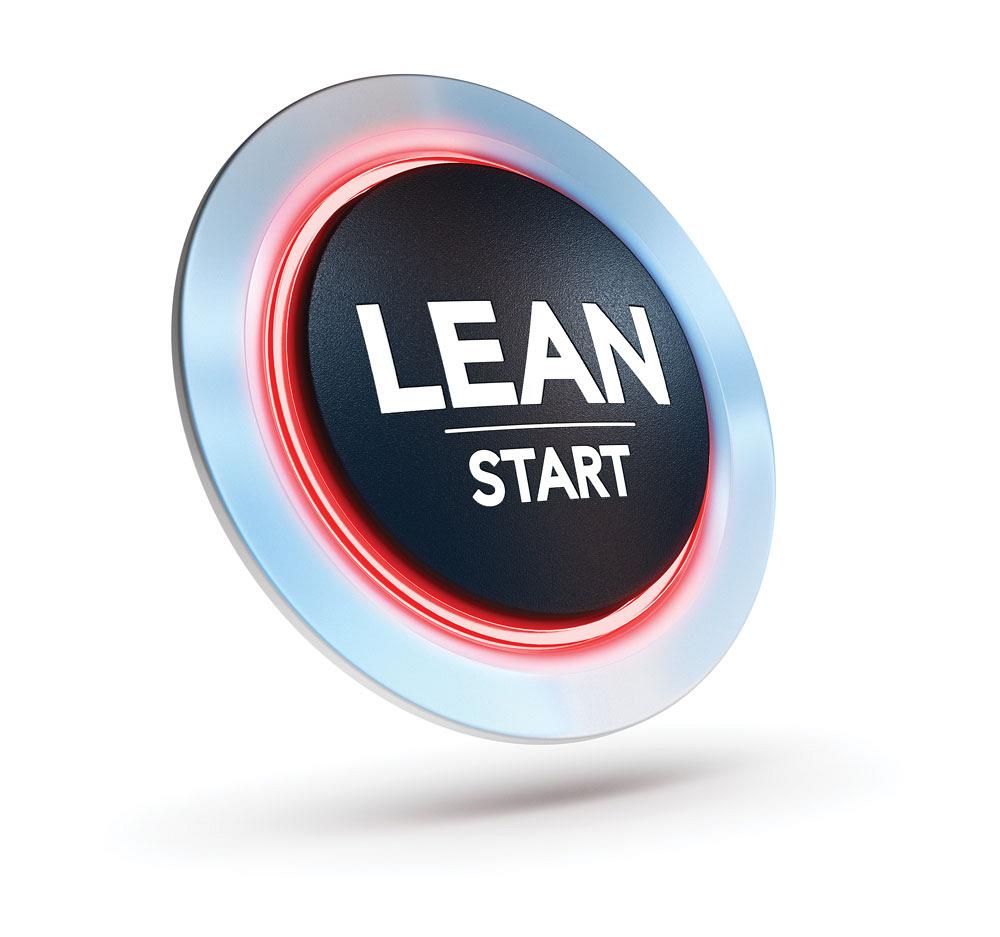Director of Smart Manufacturing
- FMA
- The Fabricator
- FABTECH
- Canadian Metalworking
Use lean thinking everywhere
Rethinking production in small and medium-sized manufacturing businesses
- By Eric Whitley
- August 15, 2022
- Article
- Management

Lean implementation can have huge positive effects on SMEs by improving efficiency and productivity.
You’ve probably heard how small and medium-sized enterprises (SMEs) are the backbones of any economy every time someone talks about the economy. They’re not wrong. According to the latest International Labour Organization (ILO) data, micro and small businesses employ a staggering 70 per cent of the world’s workforce. These are the businesses that have one to 49 employees.
Even though the importance of SMEs is well-known, the research into the production systems used by these manufacturers is very limited. Large enterprises enjoy a competitive advantage over SMEs because of the resources they can put into research, upgrades, and optimization. Consequently, SMEs around the world frequently suffer from lower productivity when compared to large enterprises.
The challenges of SMEs are not very different from those of the large enterprises, but they lack the resources and specialization required to solve them. This is where lean manufacturing, a decades-old production concept, comes into play.
What Is Lean?
Lean production is a production method and philosophy developed by Toyota in the 1930s. It aims to achieve high-productivity and low-cost manufacturing by reducing waste. While the idea is pretty simple, lean production defines waste as anything that doesn’t add value to the product that the customer is willing to pay for. This means that any process that wastes time, material, or adds no value to the product has to be changed.
The lean methodology has been adopted and applied by numerous industries around the globe to improve productivity. Today it’s a holistic approach that considers all stages of production and management. Lean is applied to achieve the key goal of low-cost production with minimum waste and high productivity for the enterprise as a whole.
The Five Principles of Lean Production
While Toyota created lean production, the term itself actually was coined much later—in 1988—by John Krafcik. Later, in 1996, authors James P. Womack and Daniel T. Jones coined the five principles of lean production.
These five lean principles are general and hold true for large enterprises as well as SMEs.
1. Define Value
Value is created entirely from the customer’s point of view. Anything that the customer is willing to pay for has value, and the rest is considered waste. This includes the manufacturing timeline, delivery time, and product quality, which all need to be balanced to achieve optimal prices.
2. Map the Value Stream
Mapping the value stream creates a graphic representation of a product’s journey from raw material to the end product. It also shows value addition at different stages of production and helps find waste that can be removed.
3. Create Flow
The process is free of waste now, but it has to flow well to achieve high efficiency and productivity at a low cost. Improving flow may mean creating tighter production sequences and achieving cross-functionality across departments.
4. Establish Pull
Pull simply means creating a production and marketing process where the customer can order and receive products without waiting, but also without the requirement of stocking for manufacturers. This can be achieved using just-in-time manufacturing.
5. Work Towards Perfection
Lean is not a state but a process, so even after working on the principles once, the plant needs to keep repeating them to achieve optimum lean production. Every employee should be involved in the process.
SMEs Need Lean Production
Lean is a concept that aims to achieve zero-waste production. The process is, in essence, one of analyzing the current processes to find parts that add no value to the product. Waste is an issue across the manufacturing industry, irrespective of enterprise size. Because of limited resources, SMEs often suffer from inefficiencies that increase production costs. Lean production can help these businesses work towards low-cost manufacturing with available resources.
SMEs require lean production for the same reasons that large enterprises do. Lean production can help SMEs reduce waste by highlighting the specific types of technologies that their plant requires instead of undertaking a complete overhaul. The goal for businesses is always higher efficiency and productivity, and lean principles have helped many thousands of businesses achieve these goals.
How SMEs Can Get Lean
Lean implementation for SMEs has to be seen differently from the processes used at large enterprises. SMEs have limited resources and conditions where many of the technologies and lean processes might not provide a solid ROI.
Here’s a quick summary of the necessary steps to implement lean in your business:
- Pre-implementation phase. In this phase, management develops a lean policy and creates a team to achieve the goals of efficiency and productivity. The team is trained in lean methodology. An initial lean perimeter is decided upon based on plant findings to implement lean production. Once the perimeter is fixed, the team comes up with a master plan and lean indicators to monitor the implementation.
- Implementation phase. During the implementation phase, the plant goes through the required upgrades for the workforce and workstations until lean manufacturing is achieved. The team models and analyzes the current situation to find opportunities for improvement. SMEs can choose lean digitization for the critical areas with a bigger impact on productivity. Pilot projects are then started for these impactful areas in the lean perimeter.
- Post-implementation phase. The post-implementation phase is where the optimization takes place through regular monitoring and customizations that achieve better results with each iteration. The findings are used to generalize actions. The goal at this stage is to standardize and capitalize on lean practices for the business. Once these are available, the team can extend the perimeter to easily implement lean principles plant wide.
Lean implementation can have huge positive effects on SMEs by improving efficiency and productivity. Amid the highly competitive environment of today’s manufacturing sector, all manufacturers are looking to improve their production, and SMEs have to actively pursue the same. Lean can reduce waste, improve product quality, and bring down production costs. By establishing pull, the warehousing costs also come down and customers get a better ordering experience with fast deliveries. Working on lean implementation also allows employees to pursue innovation in product development, which creates a sense of personal development.
And remember, lean isn’t a one-time production system change but a production philosophy and a constant process.
Eric Whitley is director of smart manufacturing, L2L, 299 S. Main St., Suite 1300 PMB 96928, Salt Lake City, Utah 84111, www.l2l.com.
About the Author
subscribe now


Keep up to date with the latest news, events, and technology for all things metal from our pair of monthly magazines written specifically for Canadian manufacturers!
Start Your Free Subscription- Trending Articles
Sustainability Analyzer Tool helps users measure and reduce carbon footprint

Mitutoyo updates its end-user portal

Enhance surface finish with high-speed machining

Equispheres secures $20 million investment round

Solid carbide drills produce precision holes in short chipping materials

- Industry Events
Automate 2024
- May 6 - 9, 2024
- Chicago, IL
ANCA Open House
- May 7 - 8, 2024
- Wixom, MI
17th annual Joint Open House
- May 8 - 9, 2024
- Oakville and Mississauga, ON Canada
MME Saskatoon
- May 28, 2024
- Saskatoon, SK Canada
CME's Health & Safety Symposium for Manufacturers
- May 29, 2024
- Mississauga, ON Canada















